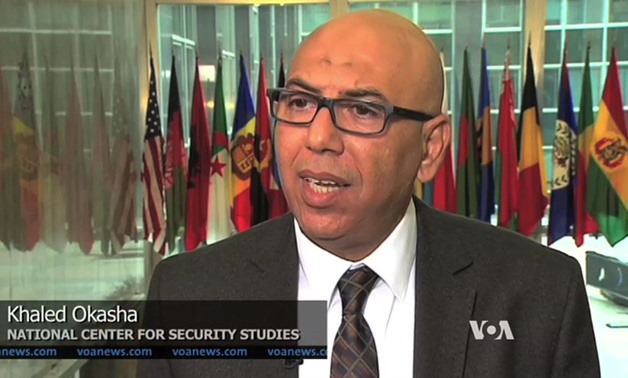
FILE-A member of the Supreme Council to Combat Terrorism and security affairs expert Khaled Okasha
CAIRO – 1 July 2018: The Muslim Brotherhood tries to reappear on the political scene; they have a hand in the Jordanian protests, a member of the Supreme Council to Combat Terrorism Khaled Okasha told Egypt Today.
Okasha remarked that the June 30 revolution, which broke out in 2013 against the currently banned Muslim Brotherhood-affiliated President Mohamed Morsi to save Egypt from terrorism, caused cracks and splits in the terrorist organization, but they try to reorganize themselves and to appear in the political scenes of Arab countries like Tunisia and Jordan.
Strategic reports referred that the recent Jordanian protests are linked to passing the “Century Deal” to pressure the Hashemite Kingdom, what do you think?
I do not agree that these events stem from the deal or from the attempt to bring Jordan into the spiral of the solutions of the Palestinian cause. The Jordanian demonstrations have been held due to the economic and political crises that Jordan has witnessed for a year, and they have been escalated due to the tensions on the Jordanian borders and its loss of main resources in Syria, Iraq and Lebanon. This caused a great economic crisis reflected in higher unemployment rates, prices, imposing more taxes, and the government’s resignation. Jordanian King Abdullah II is aware of those reasons, which clearly showed in his wisdom in handling the situations.
Additionally, Jordan faces the Syrian refugee's crisis as more than 2 million refugees live in Jordan, which costs Jordan’s treasury large sums. In response, Jordan has lodged many complaints to the United Nations (UN), pointing out that the UN's aids do not meet the refugees’ living commitments.
But, the Muslim Brotherhoods’ presence cannot be ignored in the recent Jordanian political scene.
It is true. The Brotherhood poses many great risks;their presence in the streets provokes direct confrontations between people and the security forces and raises the public's ceiling of demands. The Brotherhood also seeks to put the organization back together through stirring revolutions in many countries such as Syria, Libya, Egypt, and Tunisia.
Does this mean that Jordan is expected to witness a late “Arab Spring”?
There is no doubt that some parties are pushing in that direction, but I do not think that Jordan would enter the whirlwinds of the Arab Spring or creative chaos.I bet on the Jordanian people and the wisdom and the ability of the Jordanian Kingdom to deal with severe crises.
Could the Gulf Cooperation Council's meeting,called for by Saudi Arabia, save the situation in Jordan?
Yes, while many external parties seek to ignite the situation in Jordan, other parties try to reduce the tension in Jordan’s streets for the region’s interest. At the same time, Egypt played an important role in calling for holding this meeting and in supporting and helping Jordan compensate the loss in the foreign market. I expect that this meeting will have positive results that will boost the Jordanian economy and help further control the situation.
What do you think is the Muslim Brotherhood's strategy,especially that they are in their weakest situation, after the Arab Spring?
The June 30 revolution led to the collapse of the Muslim Brotherhood groups in Libya, Tunisia, Egypt, and Syria, but they try to reorganize themselves after the repeated defeats and the splits that have plagued the Brotherhood; the Brotherhood is still financially supported by Qatar and Turkey to be able to renter new stages and restore its power to establish the Islamic Caliphate.
Have these attempts been faced on the ground?
The terrorist international organization has not been isolated from the political scene, as witnessed in the ability of the Muslim Brotherhood in Tunisia to succeed in the municipal election less than a month ago. They are ready to enter a new round of fight in the future.In Libya, they still rely on the strong presence of tribal and armed militias, while they are trying to reorganize their bases by entering some alliances behind the scenes in Jordan and Egypt.
But, the situation in Egypt is different, especially after they had been involved in several terrorist acts.
Egyptian streets reject any reconciliation with the Muslim Brotherhood for their involvement in terrorist crimes against the Egyptian people, army and police and their involvement with terrorist armed militias such as Hasm. The Brotherhood has been internationally designated as a terrorist organization.
Despite the millions of dollars spent in support of the Brotherhood's external media, it has no effect on the Egyptian street even with the economic crises that come asa result of Egypt's economic reform process.
But, their media has a huge impact abroad, which poses pressure on Egypt.
They are more powerful abroad through media, the human rights organizations, civil organizations, and western decision-making centers; the recent report issued by the Human Rights Watch reveals their attempts to defame Egypt’s efforts to combat terrorism and dry up its sources through its war against terrorism.

Comments
Leave a Comment